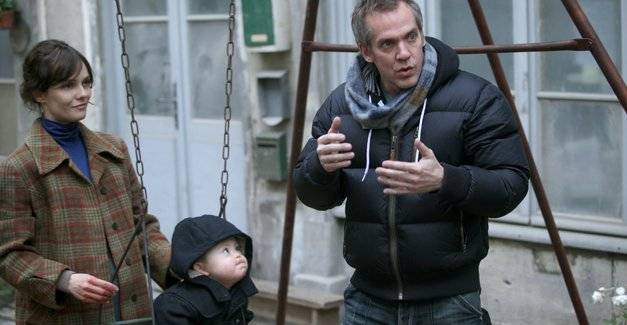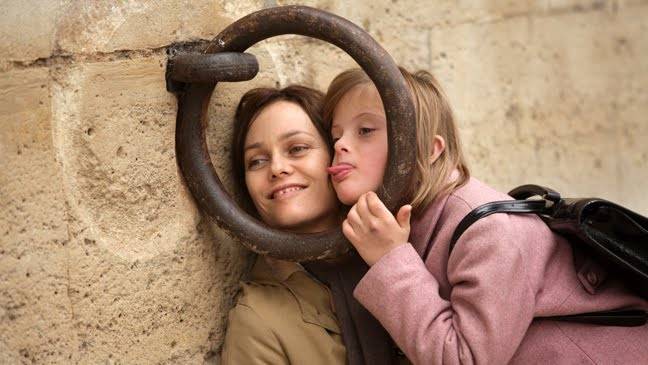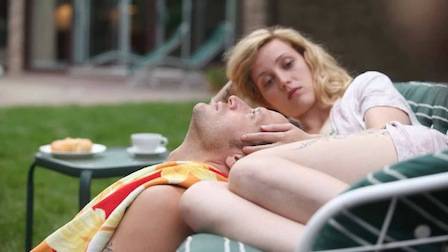Interview–Cafe de Flore’s Jean-Marc Vallee
– by Rachel Fox
After receiving both commercial and critical acclaim with films like Genie Award-winner C.R.A.Z.Y. and the Oscar-nominated period drama The Young Victoria (starring Emily Blunt), director Jean-Marc Vallee returns with Café de Flore. It’s an intense, layered and romantic new film that flirts with the supernatural.
Café de Flore offers two seemingly separate stories that slowly reveal themselves as being entirely intertwined. In one story, French superstar Vanessa Paradis plays the fiercely devoted mother of a boy with Down Syndrome in Paris in the 1960s; in the other, Kevin Parent and Hélène Florent are childhood sweethearts whose marriage has fallen apart in modern-day Montréal.
I had the opportunity to speak with the Borsos-nominated Vallée at the 2011 Whistler Film Festival. During our chat, I conveyed my appreciation for both the film (what can I say – I’m a hopeful romantic) and Paradis’ stunning performance. [Note: This interview may contain spoilers.]
Cafe de Flore is now available on DVD and VOD.

“It comes from a desire to believe in true love; to keep on believing in love, on my part. To make something so romantic, so powerful, make magic. I wanted to get out from a realistic story and flirt with a supernatural thing.” Cafe de flore director and 2011 Borsos nominee Jean-Marc Vallee. Rachel Fox photo.
Working with Down Syndrome kids
Rachel Fox: I was absolutely captivated by Vanessa in this film. Honestly, I think she takes to the prize in her household [she is married to Johnny Depp] insofar as who has given the best performance of late. I was so mesmerized by her initial scenes that I barely noticed [from costumes, sets, etc.] that her storyline was set in the ’60s. The young boy who plays her son has Down Syndrome – can you tell me about how they managed to cultivate such a believable relationship?
Jean Marc Vallee: They took a month together to learn each other–she’d have breakfast, lunch, dinner with his parents sometimes. They even went on the merry-go-rounds, to try to establish a playful thing between the two of them. Sometimes she had to be very authoritative with him; he has such a strong personality.
The thing with Down Syndrome kids is that when they don’t want something or they become confused they can become stubborn. She had to put on her mom hat. I know it looks like these two are such a pair, but it wasn’t a big thing. it just happened. They didn’t force it.
RF: Directing and acting with young children has its own unique set of challenges. How did you manage to find two French-speaking children with Down’s syndrome who would also be able to take the direction required for such a project? Can you talk about that?
JMV: In auditions, I would test them and coach them. I would say, “I am going to smile and I want you to smile like I do.” Sometimes they couldn’t do it, or do it at the right time. One time I said, “I am going to be sad, I want you to be sad and make a sad face too”, and instead of doing it they were coming to me and hugging me. And here I am thinking, Oh my God… What am I going to do? Then I met this girl, Alice [who plays Véro], who was talking so well… it’s rare for Down’s syndrome kids, they have issues and problems sometimes with facial muscles so they can have a hard time eating and talking.
We were lucky to find the characters who [In real life] go to the same school – they love each other, they want to get married, they want to have kids. We first met Alice, then she started to talk about her friend at school who she loves, and she says, “He has Down’s syndrome too!” So we said, “Really, can we meet him?” It’s pretty amazing. Thank God it happened! It took four months to find them… we looked in Paris, Belgium, Quebec. Before that I was so discouraged…
Past lives and memories
RF: The film plays with all kinds of notions about past lives and the memories from them. Do you believe in reincarnation?
JMV: It’s not a part of my life. For the duration of the film I had to be aware, to do my research. I think it’s a beautiful theory but it’s not a part of my life. But, at the same time I didn’t make a film about that.
A character in the film is using this to find an explanation. I am not trying to say, “This is me, this is what I believe and I want you to believe in this” – it’s not that at all. It’s one character and she goes there. You know why she goes there? Because she’s suffering. And when you suffer, you try to understand. And since she doesn’t find any answers with the rational thing she goes into the irrational.
RF: The music in the film is such a strong element. It’s almost like another character.
JMV: To underline the romantic an mystical aspects of the film. I was looking for tracks that were going to give us that impression, that feeling. There’s a lot about sensing. Rock and roll does that – it’s not in the head. When you listen to a Pink Floyd track or a Sigur Ros track – how do you feel? Can you try to define what your body is feeling? It’s sensual.
RF: I am thinking about the scene at the party, where Antoine and Rose meet for the first time. It’s electric between them.
JMV: The thing about sex in the film – it’s important. The music was there for that, too. If you find someone and you really care and you really love and it makes you quit the marriage and divorce – it’s not just a past life. You go there because you like the smell, you like the sex. It is there in the film. There’s something so strong between them. We needed tracks that would make us understand these people.
Listen to the music
RF: The final shot of the film is this very slow zoom into an old black and white photo within another photo. It’s very much like The Shining. Was that on purpose?
JMV: I know, of course, it looks like The Shining. When I finished writing it I put the period on the paper and thought that everyone’s going to think that. But I thought then, “Fuck it,” because it’s not exactly like The Shining, which was not a film about past lives but a fucked-up, spooky thing. In this case it was a picture taken by the father of Antoine many years before in Paris and it’s so out of focus – what I like about it is there’s two ways or more to explain the film.
For the people who would like to believe in Carole’s theory of past lives and reincarnation – well there you go, you got your answer if you want to go there. But it’s [the picture] so out of focus, it could be anything; it could be a rock, it could be a tree. There are some keys in the film, where I say my explanation of this is from Carole’s brain and imagination.
One key that tells that is the record [The Matthew Herbert Big Band‘s “Café de Flore”] from the ’60s – this can only come from Carole’s imagination. This record is a fabrication, the song was created in 2001. It’s an anachronism. It’s impossible. That’s how I wrote it. But I’d like the audience to choose their own thing. I am not imposing my ideas onto them.
Cafe de Flore is currently playing in select cities across Canada.





Pingback: Evelyne Brochu in Cafe de flore « Bring Out the Gimp
Pingback: Evelyne Brochu in Cafe de flore - Shawn Conner